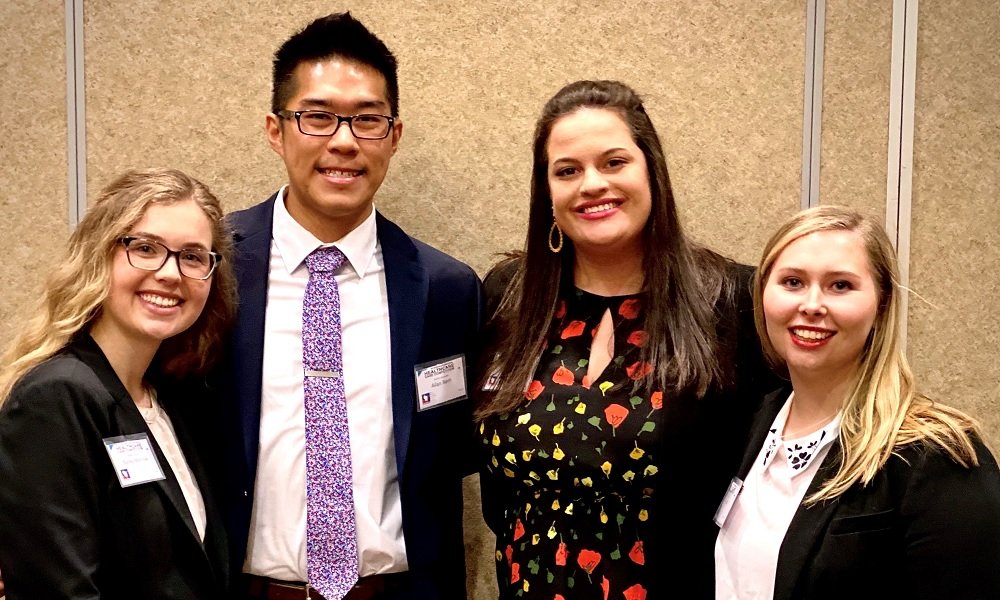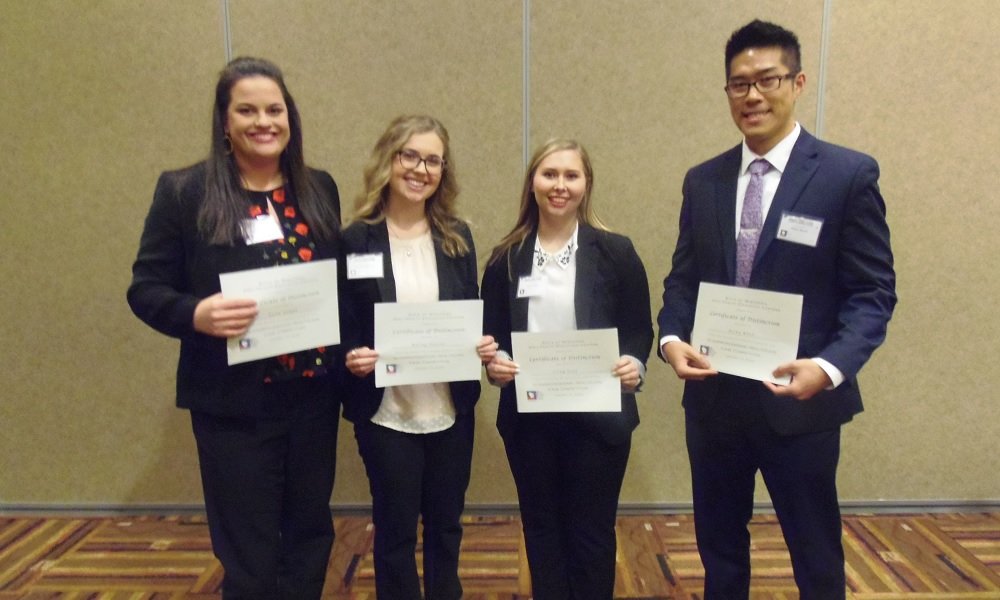
Students from Concordia University Wisconsin's pharmacy, physician assistant, social work, and occupational therapy programs collaborated to secure a second place finish in a statewide healthcare competition.
A team of Concordia University Wisconsin students took second place in a competitive statewide healthcare case competition. The competition was hosted by the Wisconsin Area Health Education Centers (AHEC). 18 schools applied from private and public universities across the state of Wisconsin, and eight were chosen to present in person on January 9-10 in the Wisconsin Dells.
The teams were comprised of students studying healthcare across disciplines. Concordia’s team was made up of two School of Pharmacy students, a Physician Assistant student, a Social Work student, and an Occupational Therapy student. Dr. Michael Oldani, Campus Coordinator of Interprofessional Development, organizes interprofessional education opportunities for students throughout the year and applauds the students for their hard work. “The office of IPE at Concordia is really proud of these students. They proved to themselves what it takes to connect as a team, make decisions together, and present a vision through a unified and collaborative effort,” said Oldani. “They were similar to our other winning teams over the last 5 years in that they truly wanted to try and figure out a complex health problem and solve it by using different kinds of professional expertise, which really is the essence of IPE.”
The collaborating students on the team are listed below:
- Alan Banh (Concordia University Wisconsin, Pharmacy)
- Anna Gomez (Concordia University Wisconsin, Pharmacy)
- Rebekah Hadle (Concordia University Wisconsin, Occupational Therapy) *Not pictured. Rebekah was on a medical mission trip during the presentation with the Occupational Therapy Department.
- Kiley Hopf (Concordia University Wisconsin, Social Work)
- Bailey Morrow (Concordia University Wisconsin, Physician Assistant)
Each team of students was assigned a case study of a complicated situation and collaborated to conduct an analysis of the efforts and opportunities within the community setting. The Concordia students came together across disciplines for the last two months.

Kiley Hopf, a social work major, noted how much she learned from other health professions while also getting to bring her own expertise to the table.
“At first, I was unsure if I wanted to compete in the AHEC Case Competition, but after all of the hard work to create a written proposal, budget, and work on a presentation with such as amazing team, I am very grateful I was given this opportunity,” Hopf said. “My team was so open and willing to work with each other. We all brought in our own specialties, but we also learned about the other health care professions and how they can interact with the homeless population. Not only did we gain a second-place win, but we also gained new friends.”
On competition day, the team traveled to the Wisconsin Dells. There, they presented their recommendations for enhanced interprofessional collaboration. A panel of judges reviewed each teams’ findings. According to AHEC, “The panel of judges consisted of leaders from multiple disciplines within Wisconsin’s healthcare community: Betsy Roesler, Richland County Drug Free Communities Coordinator; Rachelle Lancaster, Assistant Dean/Director of Pre-Licensure Programs at University of WI-Oshkosh; Roger Rego, CFO of Bridge Community Clinic; Kristin Stearns, Executive Director of Lakeshore Community Health Centers; and Logan Stiegman, AHEC Alumni.”
“The AHEC Case Competition was a wonderful experience that not only emphasized how effective and empowering working together in a team can be, but also how much there is that we each can learn from each other,” physician assistant student Bailey Morrow said. “I made some wonderful new friends and future colleagues. The experience I had is irreplaceable.”
Cash prizes were awarded to the top three teams. Concordia’s team was awarded $2,000 for their second-place finish.
Anna Gomez echoed the same positive thoughts about learning valuable skills and becoming close to her team members.
“The AHEC case competition was not only a good opportunity to learn how to work with other health professions in a team-based environment but also to become innovators in areas that we are not familiar with,” Gomez said. “Throughout our time preparing and writing the proposal and presentation outline, we were able to create a team dynamic that many groups strive for. Not only did I leave the competition with a sense of accomplishment but also with new friends and colleagues.”
Rebekah Hadle was on a medical mission trip in Africa during the competition presentation in Wisconsin Dells. Team member Baily Morrow applauded Rebekah’s contribution in the overall 2-month case study: “Even though she was unable to participate in the event, she dedicated a lot of time and knowledge to the case. She definitely was a huge team player and her efforts deserved to be recognized as well.”
For more information about Concordia’s healthcare programs, visit www.cuw.edu.
—
If this story has inspired you, why not explore how you can help further Concordia's mission through giving.